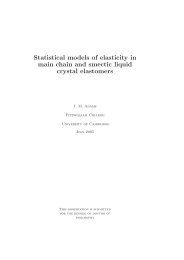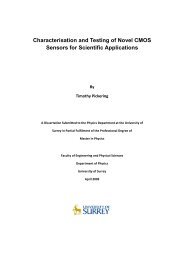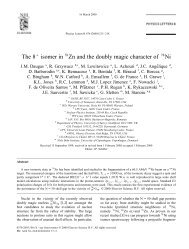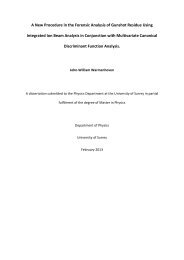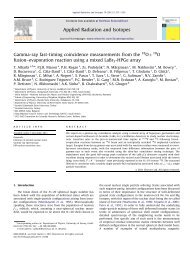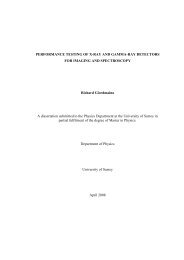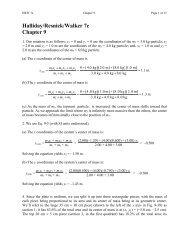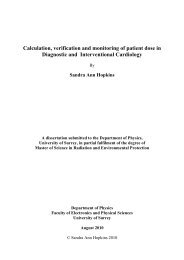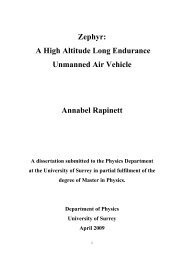Review of Quantum Physics
Review of Quantum Physics
Review of Quantum Physics
You also want an ePaper? Increase the reach of your titles
YUMPU automatically turns print PDFs into web optimized ePapers that Google loves.
14 CHAPTER 1. REVIEW OF QUANTUM PHYSICSIf two observables are compatible then the share eigenstates |a n 〉 = |b n 〉. ConsequentlyˆBÂ|a n〉 = ˆBa n |a n 〉 = a n b n |a n 〉 (1.80)ˆB|b n 〉 = Âb n|a n 〉 = a n b n |b n 〉 (1.81)⇒ (ˆB − ˆBÂ)|a n〉 = 0. (1.82)This is true for all eigenstates, so we knowthat compatible observablesmust commute! The commutator<strong>of</strong> two observables is defined by [Â, ˆB] = ˆB− ˆBÂ, and plays a central role in quantum mechanics.Note the converse is true: if we have two observables that commute then they are compatible[Â, ˆB]|Ψ〉 = 0 (1.83)⇒ ˆB|b n 〉 = ˆBÂ|b n〉 = Âb n|b n 〉 (1.84)⇒ ˆB(Â|b n〉) = b n (Â|b n〉) (1.85)⇒ Â|b n〉 ∝ |b n 〉 i.e. |b n 〉 are  eigenstates! (1.86)We have proven that if  and ˆB commute then the are compatible.If we have two incompatible (i.e. non-commuting) observables  and ˆB, and we alternate in theirmeasurement, then we repeatedly change the state that the system is in. They lie at the heart <strong>of</strong> theuncertainty relation in quantum mechanics.Generalised Uncertainty RelationWe define the deviation <strong>of</strong> an operator from its mean value by d = Â−Ā. (1.87)The uncertainty <strong>of</strong>  is then (∆A)2 = 〈Â2 d 〉 = 〈Â2 〉−Ā2 , and similarly for B. For an arbitrary state|Ψ〉 we consider the state|Φ〉 = (Âd +iλˆB d )|Ψ〉. (1.88)If we calculate 〈Φ|Φ〉 ≥ 0 we find〈Ψ|(Âd −iλˆB d )(Âd +iλˆB d )|Ψ〉 = (∆A) 2 +λ 2 (∆B) 2 +λ〈i[Âd, ˆB d ]〉. (1.89)This is true for all λ. We can minimise over λ to get the best bound, soNow since Ā and ¯B are just numbers, they must commute so〈i[Âd, ˆB d ]〉 2 −4(∆A) 2 (∆B) 2 ≤ 0. (1.90)∆A∆B ≥ 1 2 |〈i[Â, ˆB]〉| (1.91)As an example <strong>of</strong> this consider A = x and B = p. Their commutator is given byso we have ∆x∆p ≥ 1 2¯h.[ˆx, ˆp]ψ = x(−i¯h) ddx ψ +i¯h d (xψ) = i¯hψ (1.92)dx



